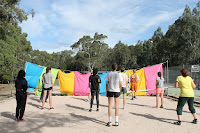This chapter helps us to consider who becomes a leader, how
that leader is supported, and what that leader can be doing or him/herself in
self care.
Look around your church and see who it is that is involved
in youth ministry. For most of us, that person who is leading the youth
ministry is someone from inside the church family, and is most likely doing
this as a volunteer. And in most places, that is OK. But even volunteer leaders
need to be given some training and guidance so they know what they are doing;
and so they know that what they are doing is supported by the elders of the church.
In most cases in the research, members of the youth leadership
team are people who have grown too old to attend youth group themselves. Now,
in most cases, that’s fine. Those young adults who have outgrown the youth
space in your church are prime candidates to be youth leaders. They know the
church and the community; they know the families; they know how things work in
that church; they are often ready and willing to be involved. Great.
But consider this – do the teenagers in your church just
assume that they will become youth leaders when they are 18 or 21? Do they
believe that their age is enough to make them leaders? I ask because in one
place that was a part of this study, this was the implicit expectation (p27).
Obviously, I don’t think anyone should become a leader just because they are
too old for youth group. There is much more required than that.
Here’s something else to consider. Youth from the church
becoming leaders bring enormous strengths which I’ve already listed. But there
could also be some unexpected weaknesses.
“We noted in the research that most youth leaders were
carrying on the practices that they had experienced within their church. They,
they were not approaching the task innovatively or creatively, or in a way that
adequately took into account the changing needs of each generation of youth.” (p27)
How can we work around this potential problem?
Training
I’m a little disturbed that many leaders interviewed “did
not feel the need for training”. We all want to do our best, and most of us
think we are doing all right. But that can certainly be enhanced with some
effective training. This doesn’t mean doing a Bachelor of Ministry – although that’s
not the worst suggestion. Training can be short term or even occasional, but
there should be some training.
“It would seem that the development of the expectation that
youth leaders would do some training, if only a few days of intensives, would
strengthen the confidence of youth leaders and enhance the equality of
leadership.” (p29)
Also, I will be teaching a short course at the Presbyterian
Theological College in Melbourne starting late July 2016. Leave a message for
me if you would like to know more about that.
Payment
How many youth leaders get paid anything? Very few is the
general answer. Most churches will struggle to find the funds to pay for a full-time
youth worker, and many other churches will struggle to believe they should. I
would (perhaps naturally) encourage churches to make some payment to the youth
leaders.
The most disturbing comment on paying youth leaders is this:
“In a number of churches, young people said that paid people might not be
motivated in the same way as volunteers, and, by implication, said that paid
employees might not be as passionate about youth ministry.” (p29) Before I
stand up to give a list of reasons why this is wrong, the authors of the
research make this helpful comment: “There is no evidence that such
remuneration reduced passion.” I agree.
 Support
Support
Most youth leaders – especially the paid ones – can tell you
about the time they were verbally stripped down by either a parent, an elder or
a senior pastor. And if not that, they can certainly tell you the times and
places they felt completely unsupported.
Senior pastors, you are the greatest source of strength and
support to your youth leaders. Even if you don’t attend the youth group very
often, I urge you to please meet with and encourage your youth leaders.
Youth leaders, if you are looking for more support and don’t
know where to go, send me an email and I’ll come and meet with you or do what I
can to support you. You might feel alone, but you’re not really.
Finally, the authors close this chapter with a section on
Self-Care.
Self-Care
People burn out. People who work with people burn out
quicker. Youth leadership can be very demanding and the load can be heavy and
slippery. So, even where there is good support from others, taking care of
yourself also matters. One aspect to this is setting some solid and appropriate
boundaries.
“No one has the capacity for deep and intimate relationships
with everyone. One needs to be clear about how much time to spend and where to
spend it with those who come for help.” (p31)
Serving Jesus is fantastic, but serving Jesus can also come
at a cost. Serving Jesus doesn’t take away the reality that we are still human
and need to rest. We also need places where we can just enjoy being with people
without being the person in charge. And it’s probably good to have something to
do that is separate from your youth work. If you’re an introvert, then you will
need to be extra careful about the amount of time you spend with people.
Practicing good self-care contributes to faithful and
effective ministry.
There is much in this research which all pastors,
both youth and senior, should take seriously. In this series of posts, I hope
to give a brief summary of each chapter. Of course, you will be much better off
if you purchase the book yourself.
 PYV Summer Camp features our own radio show each night. West Camp 2016 has introduced a morning radio show, and it's been a great way to start each day. Tim and Rebecca, supported by the tech skills of Ryan, are providing a fun and informative show with news of the day, weather, (most of which almost resembles reality) and interviews. This has been a good thing to do.
PYV Summer Camp features our own radio show each night. West Camp 2016 has introduced a morning radio show, and it's been a great way to start each day. Tim and Rebecca, supported by the tech skills of Ryan, are providing a fun and informative show with news of the day, weather, (most of which almost resembles reality) and interviews. This has been a good thing to do.























